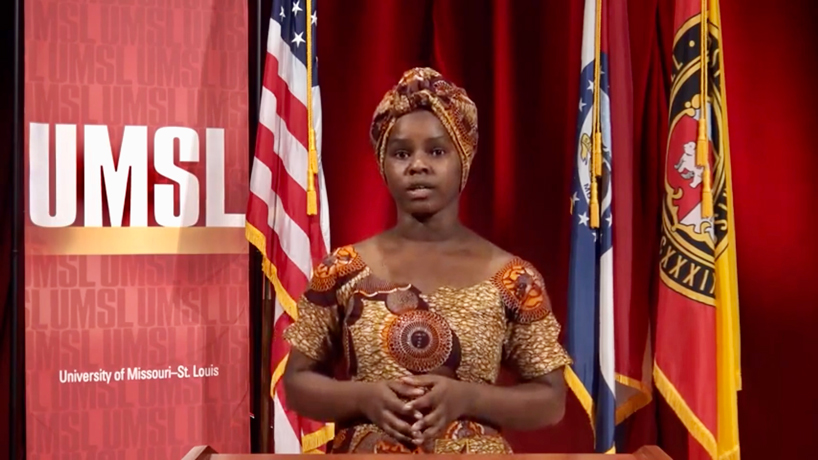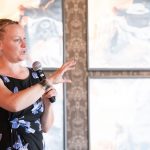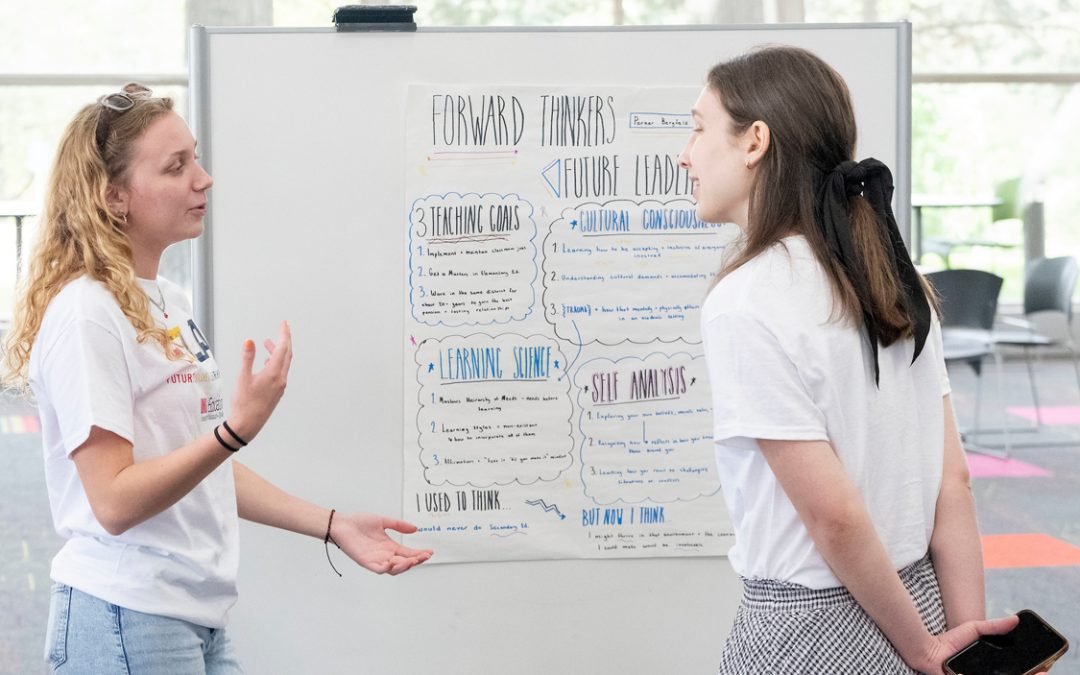
Adeline S. Ibrahim founded The Future Generation Girls, an outreach program to empower young women and connect them to community resources. She graduated this weekend with a a BSW and minor in psychology. (Screenshot)
The onset of the COVID-19 pandemic upended daily life for children across the country, as schools moved to remote learning and parents struggled with childcare.
Adeline S. Ibrahim saw the difficulties firsthand at her church, and decided to do something.
“I started thinking of what is it that I can do for my community that can help them,” she said. “The parents of the kids, most of them are busy going to work and leaving the kids with their older siblings and the older siblings are not putting effort into entertaining the younger ones. I was like, ‘Well, I’m one of the oldest girls in my church, let’s try to see if we can figure out something.’”
Ibrahim subsequently founded The Future Generation Girls, an outreach program to empower young women and connect them to community resources, during her final year at the University of Missouri–St. Louis. Her education in social work aided the initiative, and she graduated from UMSL Saturday with a BSW and minor in psychology.
Entering the social work field was natural for Ibrahim, who has always been drawn to serving others.
“I like helping people, and I like to make a difference,” she said.
She often helped her grandmother with day-to-day chores and errands during a childhood that spanned two continents and many cultures. Ibrahim was born in Tanzania and came to the U.S. when she was about 8 years old. Her family first settled in Colorado before moving to the St. Louis area when she was in high school.
After graduating, she earned an associate degree in human services and then began looking at bachelor’s programs in the area. UMSL was one of her top choices because of its affordability and the diverse student population.
Ibrahim said she’s enjoyed every second of her time in the classroom and has used principles learned in the upper level course, “Human Service Organizations,” to effectively administer The Future Generation Girls.
In January, she was recognized at the annual Dr. Martin Luther King Jr. Holiday Observance for an essay on the late civil rights icon. The essay netted her the UMSL Martin Luther King Jr. Scholarship, which comes with a $1,000 award.
“I mostly focused on the things that MLK did and what really happened,” Ibrahim said. “How people can think of where we are now and that things have changed. We should be able to see each other as one and help each other.”
Ibrahim has also kept busy outside of the classroom. In addition to her studies, she’s worked as a caregiver and as a certified community health worker and led The Future Generation Girls since last July.
As an uncertain school year loomed, Ibrahim consulted her family and elders at Pentecostal Fellowship of the Holy Spirit about her idea for an outreach group. After presenting her vision, they signed off on it.
The Future Generation Girls has met weekly for nearly a year now. The goal is to inspire and guide a new generation of girls, supplying them with the resources they need to thrive personally and academically.
The group is comprised of about 20 girls and young women from the church ages 9 to 18. Ibrahim felt preteens and teenagers were especially important to support.
“I chose that age because that’s the age that I feel like a lot of girls are finding themselves, where they belong and also always want to know a lot of things but are afraid of asking,” she explained.
She noted that a lot of the parents in her community don’t have the time for “mother-daughter talks” because they’re working so much, but The Future Generation Girls aims to provide a caring environment where the girls can ask questions. At meetings, members also work on developing self-confidence and self-esteem and learn about feminine hygiene.
“If I can create that trust with these girls, we can be able to connect,” Ibrahim said. “I can be like a bridge to their parents in case they need something.”
Meetings also serve as informal English lessons. Like Ibrahim, members come from countries in eastern Africa and speak either Swahili or Kirundi as a first language.
The group is helping girls and young women in other ways, as well. Ibrahim has fundraised to provide them with school supplies and menstrual products – necessary items that their parents might not be able to afford. Key support came from a local chapter of the Lions Clubs International. She made a presentation to the organization in September and secured a $1,000 donation that went toward books and trips to the St. Louis Science Center, St. Louis Zoo and Six Flags.
For several members, college has become a newfound option with Ibrahim’s guidance.
“I do have one who I was able to help her get into St. Louis Community College – Forest Park,” she said. “So now, she came back like, ‘You’re my big sister. I wouldn’t have reached this far without your encouragement – the way you pushed me.’”
That’s not the only success story. The differences in all the girls that occurred in a little less than a year have been remarkable.
“I was able to see the change,” Ibrahim said. “The girls came from knowing nothing and ended up knowing something. I was able to let them know, whenever you need something, tell me. When I advise them, they take that advice and they put into an action.
“I’ve also received compliments from the pastors and the parents like, ‘Oh, what you’re doing is great. You have helped my child open up to me and move forward with things that I did not expect, so continue the good work.’”
Now that she’s graduated, Ibrahim plans to find a social work position and work for a while before pursuing a master’s degree. But she doesn’t imagine that she’s done with outreach work while there are still those needing guidance into the future.
“I do see myself doing similar things, if I’m still here in St. Louis or not, because of that social worker education instilled in me, wanting to help people, wanting to provide services, wanting to give referrals,” she said. “I’ve seen the benefits of it.”














